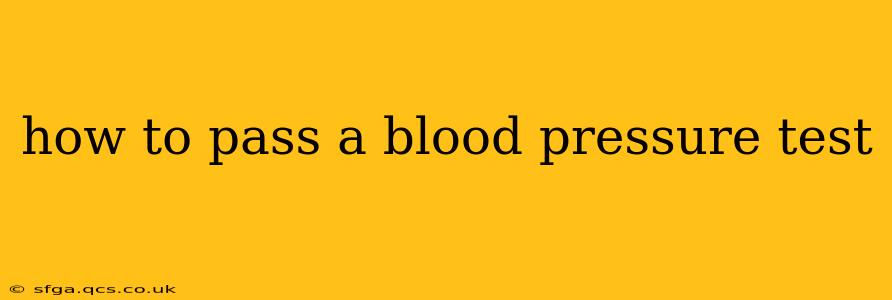High blood pressure, or hypertension, is a serious health concern affecting millions worldwide. While there's no way to "trick" a blood pressure test to show a falsely low reading, understanding how to manage your blood pressure and achieve healthy readings is crucial for your well-being. This guide focuses on preparing for a blood pressure test and, more importantly, adopting a lifestyle that promotes healthy blood pressure levels.
What are the normal blood pressure readings?
Normal blood pressure is generally considered to be below 120/80 mmHg (millimeters of mercury). However, your doctor will consider your individual health history and other factors to determine what's optimal for you. Readings between 120/80 and 139/89 mmHg are considered prehypertension, indicating a higher risk of developing hypertension. Readings of 140/90 mmHg or higher indicate hypertension.
How can I lower my blood pressure before a blood pressure test?
This is a crucial point to clarify. While short-term actions might temporarily lower your blood pressure, they don't address the underlying issue. Attempting to artificially lower your blood pressure before a test is not recommended and may be detrimental to your health. Your doctor needs an accurate reading to assess your health. Instead of focusing on temporary lowering, consider these healthy habits:
What are some lifestyle changes to lower blood pressure?
This is the most effective long-term strategy. Sustainable lifestyle changes are far more beneficial than any quick fix.
- Dietary Adjustments: A diet rich in fruits, vegetables, and whole grains, while limiting sodium, saturated fats, and processed foods, is essential. The DASH diet (Dietary Approaches to Stop Hypertension) is often recommended.
- Regular Exercise: Aim for at least 150 minutes of moderate-intensity aerobic exercise per week, such as brisk walking, jogging, or swimming.
- Weight Management: Losing even a small amount of weight can significantly impact blood pressure if you're overweight or obese.
- Stress Reduction: Chronic stress contributes to high blood pressure. Practice relaxation techniques like deep breathing, meditation, or yoga.
- Limit Alcohol Consumption: Excessive alcohol intake can raise blood pressure.
- Quit Smoking: Smoking damages blood vessels and contributes to hypertension.
- Sufficient Sleep: Aim for 7-8 hours of quality sleep per night.
Does caffeine affect blood pressure readings?
Caffeine can temporarily raise blood pressure in some individuals, although the effect varies. It's generally advised to avoid caffeine for a few hours before your blood pressure check to ensure the most accurate reading. However, avoiding caffeine isn't a substitute for addressing underlying high blood pressure.
Will anxiety affect my blood pressure reading?
Yes, anxiety can significantly elevate blood pressure readings. This is known as "white coat hypertension," where blood pressure is higher in a clinical setting due to stress and anxiety. Deep breathing exercises before your appointment can help minimize this effect. Your doctor might also take multiple readings to get a more accurate picture.
How can I prepare for a blood pressure test?
- Rest: Avoid strenuous activity for at least 30 minutes before the test.
- Avoid Smoking or Caffeine: As mentioned earlier, avoid these stimulants before the test.
- Relax: Practice relaxation techniques to minimize stress.
- Comfortable Clothing: Wear loose-fitting clothing to avoid constriction.
- Empty Bladder: Emptying your bladder before the test can improve comfort and accuracy.
Disclaimer: This information is for educational purposes only and should not be considered medical advice. Always consult with your doctor or healthcare provider for diagnosis and treatment of any health condition, including hypertension. They can provide personalized recommendations based on your individual health needs.
